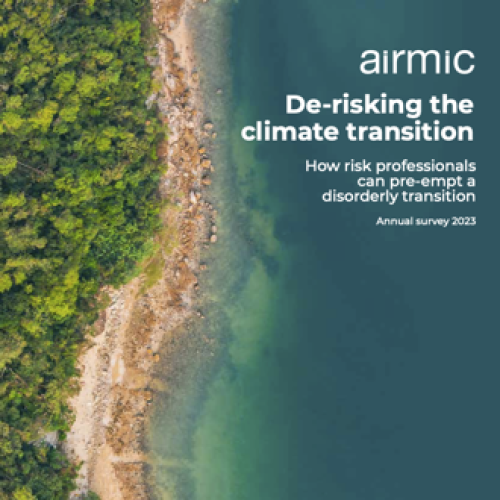De-risking the climate transition (Annual Survey 2023)
Overview
-
Airmic members are important insurance buyers. The estimated total annual insurance spend in 2022 for the organisations that they represent was £14.5 billion. They are well positioned to bring synergy between insurers – large corporations which are making some of the most consequential climate commitments in the world today – and the businesses and organisations they are helping to navigate the climate transition.
-
53% of respondents lack clarity about the budgets their organisations have set for their transition plans. In line with good practice, the transition plans of organisations should describe the supporting financial plans, budgets and related financial targets, such as the amount of capital and other expenditures supporting their decarbonisation strategy.
-
One of the key challenges faced by risk professionals today as part of the climate transition lies in accurately measuring the Scope 3 emissions of their organisations – emissions that are the result of activities from the organisation’s value chain. At times, they have had to rely on low-quality data from their supply chain partners or have had no option but to make estimations based on third-party sources such as industry averages.
-
Airmic members are calling for more consistency on the climate-related questions asked by underwriters as part of their underwriting submissions to insurers.
-
Concerns over reputational risks trump all other climate-related insurance gaps for organisations.
-
There is a sense from the roundtables run by Airmic that the onslaught of climate regulations today could have the perverse effect of leading to less disclosure and more ‘green hushing’.
-
While the anti-ESG movement is predominantly still a US phenomenon, pension fund investments are among the most affected by this stance. The organisations of some Airmic members with sustainability products in some of the US states that have passed anti- ESG legislation are faced with a commercial challenge.
-
Risk professionals are looking to insurers, brokers and consultants to help with data and project management, reporting and modelling – for the purpose of compiling the Task Force on Climate-related Financial Disclosures (TCFD), among other requirements.
-
The voice of the customer is becoming more consequential in the insurance industry’s climate transition. Airmic members are increasingly including reference to ESG priorities and actions in their insurance renewal presentations. Where their organisation has a captive insurance company, it is likely to connect with the parent on ESG. Some of their captives have an ESG framework and they too formally assess ESG performance.
-
Over 40% of respondents say they consider the positions of insurers and brokers on ESG issues, when considering whom they will use.
- Fill out an application Our membership manager will assess your eligibility against our criteria.
- Complete your profileIf you are eligible for membership you will be asked to answer a few questions about yourself.
- PaymentYou can make payment online using a card or request an invoice.

